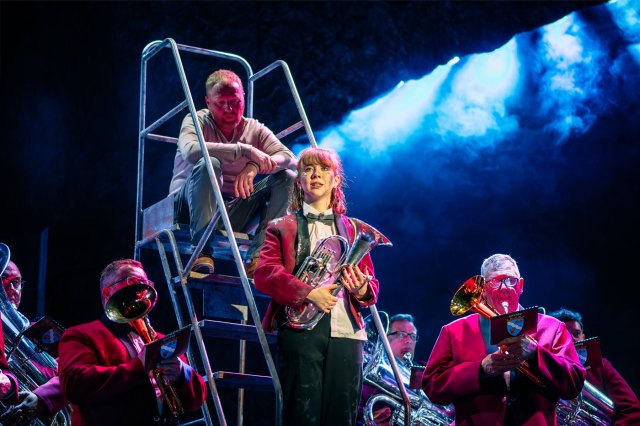National Theatre of Scotland’s Keli on tour – review
Martin Green’s debut play is currently being staged in Edinburgh, before heading to Dundee, Perth and Glasgow

Keli is Martin Green’s love letter to his adopted community and to its music. Some years ago, the writer moved to a former mining community in the south of Scotland and became captivated by the brass band that used to be associated with the pits. The mines are long gone, of course, but the bands carry on, and at Keli‘s centre is an exploration of the band’s impact on a community where “the band is the toon and the toon is the band.”
It’s also a deep dive into the life of the title character. Keli is a troubled young lady with a dead end job, a vulnerable mother and seemingly few prospects; but when she picks up the tenor horn she becomes another person, somebody empowered by the experience of making music and liberated by the fact that the few inches of air that vibrates through her horn is one of the few things in life she can really control. Her band has got through to the national finals in the Royal Albert Hall, and band leader Brian has tasked her with playing the solo, but can Keli cope with the pressure and aid the band to success?
At its heart this is a simple story that, well told, can be a hugely powerful one. The problem is that Green’s script shrouds it in so much extraneous material which ultimately obscures it. The most bizarre aspect is a strange, fantasy-like framing device where Keli finds herself trapped in the pitch-dark depths of an old coal mine, conversing with the spirit of a long-dead local miner-musician. These mythic resonances jar uncomfortably with the play’s naturalistic depiction of a working-class community, and the eventual pay-off for the device feels rather laboured when it arrives halfway through the second act.

The rest of the script is cluttered with things that are less mythic but still distracting, including class warfare, family pain and the ongoing trauma of the miners’ strike. There’s a strange episode in an alternative London night club, which feels like a lurching gear change for some fairly rudimentary plot reasons. More worryingly, the play’s language is problematic. The dialogue is very foul-mouthed, but only from the working-class characters. Why? Is it because they’re permanently angry, or is Green suggesting that poor people are more naturally inclined to use the f-word? It’s one of many jarring touches (did we really need a Suella Braverman joke?) that distract from what should be the clearly told story of a person and a community about whom Green clearly cares deeply.
Bryony Shanahan’s production for the National Theatre of Scotland is flexible enough, but the darkness of the coal mine frames Alisa Kalyanova’s sets too literally. Liberty Black is a force of nature in the title role, giving Keli a refreshing richness of life, even for all the ways the script boxes her in, and Olivia Hemmati is terrific in two diametrically different roles. The other characters are all pretty stereotypical, though (the gruff band leader with a soft heart, the troubled mother, the snooty aristocrat) and ultimately it’s left to the music to give the show its heart.
The magisterial swell of the Whitburn and Kingdom bands, who fill the stage in the final moments, really catch the heart. Tellingly, it’s when the words stop that the show really finds its soul.















